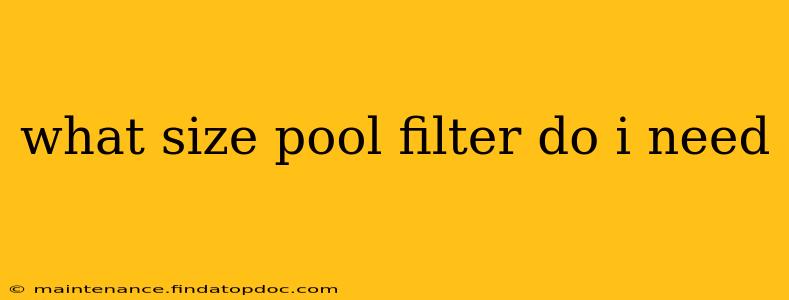What Size Pool Filter Do I Need? Finding the Perfect Fit for Your Pool
Choosing the right pool filter is crucial for maintaining sparkling clean water and extending the lifespan of your pool. Getting the size wrong can lead to overworked equipment, poor water quality, and costly repairs. This guide will help you determine the appropriate filter size for your needs. We'll cover everything from understanding GPM (gallons per minute) to considering your pool's unique characteristics.
What are the key factors to consider when choosing a pool filter size?
This is a crucial question, and the answer isn't a single number. Several factors influence the size of the filter you'll need:
- Pool size: The larger your pool, the more water needs filtering, requiring a larger filter with a higher flow rate.
- Pool type: In-ground pools typically require larger filters than above-ground pools due to their volume.
- Pump horsepower (HP): Your pump's horsepower determines its flow rate, directly impacting the filter's necessary capacity. A more powerful pump needs a filter that can handle the increased water volume.
- Filter type: Different filter types (sand, cartridge, diatomaceous earth) have varying filtration capacities and flow rates. A cartridge filter, for instance, generally has a lower flow rate than a sand filter of the same size.
- Water turnover rate: This refers to how quickly your filter can process all the water in your pool. The ideal turnover rate is generally between 6-8 hours for most pools. A faster turnover rate generally requires a larger filter and pump.
How do I calculate the GPM (gallons per minute) I need?
Understanding GPM is critical. This figure represents the volume of water your filter can process per minute. While a precise calculation requires professional assessment, a rough estimate can be made considering the pool's volume and desired turnover rate. For example, a 10,000-gallon pool aiming for a 6-hour turnover would require a filter with approximately 28 GPM (10,000 gallons / 6 hours / 60 minutes).
However, this is a simplified calculation. Consider the other factors above for a more accurate assessment.
What are the different types of pool filters, and how do their sizes compare?
There are three main types of pool filters:
- Sand filters: These are the most common and generally more affordable. Their size is measured by the diameter of the tank (e.g., 18", 24", 36"). Larger diameter tanks typically handle higher GPM.
- Cartridge filters: These offer finer filtration than sand filters. Size is indicated by the surface area of the filter cartridges, with larger surface areas correlating to higher capacity.
- Diatomaceous earth (DE) filters: These provide the finest filtration, ideal for exceptionally clear water. Size is often measured by tank diameter, similar to sand filters.
Larger tank sizes generally mean higher GPM capacity for sand and DE filters. For cartridge filters, look at the square footage of the filter cartridges; more square footage generally equals higher flow rates.
What happens if I choose a filter that's too small or too large?
- Too small: The filter will constantly struggle to keep up, resulting in poor water quality, cloudy water, and a shortened lifespan for both the filter and the pump.
- Too large: While not as problematic as a filter that is too small, an oversized filter might be unnecessarily expensive and could lead to underutilized equipment.
Should I consult a professional to determine my pool filter size?
Yes, consulting a pool professional is highly recommended. They can assess your specific pool's characteristics, consider all the relevant factors discussed above, and recommend the optimal filter size and type. This ensures you invest in the right equipment for maintaining clean, healthy pool water. They can also help with installation and ensure proper setup for optimal performance.
This comprehensive guide provides a solid foundation for understanding pool filter sizing. However, remember that a professional assessment is always the safest way to guarantee you select the right filter for your pool's unique needs. Don't hesitate to reach out to a pool professional for personalized advice and guidance.
